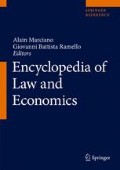Access this chapter
Tax calculation will be finalised at checkout
Purchases are for personal use only
References
Bourreau-Dubois C, Doriat-Duban M, Ray JC (2014) Child support order: how do judges decide without guidelines? Evidence from France. Eur J Law Econ 38(3):431–452
Boyd CL, Epstein L, Martin AD (2010) Untangling the causal effects of sex on judging. Am J Polit Sci 54(2):389–411
Cameron CM, Kornhauser LA (2017) Rational choice attitudinalism? Eur J Law Econ 43:535–554
Casillas CJ, Enns PK, Wohlfarth PC (2011) How public opinion constrains the U.S. Supreme Court. Am J Polit Sci 55(1):74–88
Christmann R (2014) No judge, no job! Court errors and the contingent labor contract. Eur J Law Econ 38(3):409–429
Coase RH (1960) The problem of social cost. J Law Econ 3:1–44
Collins PM, Martinek WL (2010) Friends of the circuits: interest group influence on decision making in the U.S. courts of appeals. Soc Sci Q 91(2):397–414
Collins PM, Solowiej LA (2007) Interest group participation, and conflict competition, the U.S. Supreme Court. Law Soc Inq 32(4):955–984
Dyevre A (2016) Domestic judicial defiance and the authority of international legal regimes. Eur J Law Econ 44:453. https://doi.org/10.1007/s10657-016-9551-2
Epstein L (2016) Some thoughts on the study of judicial behavior. William & Mary Law Review 57(6): 2017–2073
Epstein L, Kobylka JF (1992) The Supreme Court and legal change: abortion and the death penalty. Thornton H. Brooks series in American Law & Society. The University of North Carolina Press, Chapel Hill
Epstein L, Martin AD (2010) Does public opinion influence the Supreme Court? Possibly yes (but We’re not sure why). J Constit Law 12(2):263–281
Epstein L, Landes WM, Posner RA (2013) The behavior of federal judges. Harvard University Press, Cambridge
Farhang S, Wawro G (2004) Institutional dynamics on the U.S. court of appeals: minority representation under panel decision making. J Law Econ Org 20(2):299–330
Fon V, Parisi F (2006) Judicial precedents in civil law systems: a dynamic analysis. Int Rev Law Econ 26:519–535
Garoupa N, Gomez-Pomar F, Grembi V (2013) Judging under political pressure: an empirical analysis of constitutional review voting in the Spanish Constitutional Court. J Law Econ Org 29(3):513–534
Giles MW, Blackstone B, Vining RL (2008) The Supreme Court in American democracy: unraveling the linkages between public opinion and judicial decision making. J Polit 70(2):293–306
Grezzana S, Ponczek V (2012) Gender bias at the Brazilian superior labor court. Braz Rev Econom 32(1):73–96
Harnay S, Marciano A (2004) Judicial conformity versus dissidence: an economic analysis of judicial precedent. Int Rev Law Econ 23:405–420
Josselin JM, Marciano A (1997) The paradox of leviathan: how to develop and contain the future European state? Eur J Law Econ 4(1):5–22
King KL, Greening M (2007) Gender justice or just gender? The role of gender in sexual assault decisions at the international criminal tribunal for the Former Yugoslavia. Soc Sci Q 88(5):1049–1071
Lopes F, Azevedo PF (2017) Government appointment discretion and judicial independence: preference and opportunistic effects on Brazilian Courts. Working paper – Insper. Available on https://www.insper.edu.br/working-papers/working-papers-2017/government-appointment-discretion-and-judicial-independence-preference-and-opportunistic-effects-on-brazilian-courts/
Melcarne A (2017) Careerism and judicial behavior. Eur J Law Econ 44:1–24
Peresie JL (2005) Female judges matter: gender and collegial decision-making in the federal appellate courts. Yale Law J 114(7):1759–1790
Portuese A (2012) Law and economics of the European multilingualism. Eur J Law Econ 34(2):279–325
Posner RA (2008) How judges think. Harvard University Press, Cambridge
Pritchett CH (1968) Public law and judicial behavior. J Polit 30:480–509
Richards D (2017) Lee Epstein, William M. Landes, Richard A. Posner: the behavior of federal judges: a theoretical and empirical study of rational choice. Eur J Law Econ 43:555–558
Schneider MR (2005) Judicial career incentives and court performance: an empirical study of the German labour courts of appeal. Eur J Law Econ 20(2):127–144
Schwartz A, Murchison MJ (2016) Judicial impartiality and independence in divided societies: an empirical analysis of the constitutional court of Bosnia-Herzegovina. Law Soc Rev 50(4):821–855
Sherwood RM (2004) Judicial performance: its economic impact in seven countries. Paper presented in the 8th annual conference da international society for new institutional economics (ISNIE), Tucson. Available on http://www.isnie.org
Smyth R (2005) The role of attitudinal, institutional and environmental factors in explaining variations in the dissent rate on the High Court of Australia. Aust J Polit Sci 40(4):519–540
Sunstein CR, Schkade D, Ellman LM, Sawicki A (2006) Are judges political? An empirical analysis of the federal judiciary. The Brookings Institution, Washington, DC
Tate CN (1983) The methodology of judicial behavior research: a review and critique. Polit Behav 5(1):51–82
Tridimas G, Tridimas T (2002) The European Court of Justice and the annulment of the tobacco advertisement directive: friend of national sovereignty or foe of public health? Eur J Law Econ 14(2):171–183
Tsaoussi A, Zervogianni E (2010) Judges as satisficers: a law and economics perspective on judicial liability. Eur J Law Econ 29(3):333–357
Vaubel R (2009) Constitutional courts as promoters of political centralization: lessons for the European Court of Justice. Eur J Law Econ 28(3):203–222
Weder B (1995) Legal systems and economic performance: the empirical evidence. In: Rowat M et al (eds) Judicial reform in Latin America and the Caribbean – proceedings of a World Bank Conference. World Bank technical paper number 280. The World Bank, Washington, DC
Yeung L, Azevedo PF (2015) Nem Robin Hood nem King John: testando o viés anti-credor e anti-devedor dos magistrados brasileiros. Econ Anal Law Rev 6(1):1–12
Author information
Authors and Affiliations
Corresponding author
Editor information
Editors and Affiliations
Rights and permissions
Copyright information
© 2019 Springer Science+Business Media, LLC, part of Springer Nature
About this entry
Cite this entry
Yeung, L. (2019). Empirical Analysis of Judicial Decisions. In: Marciano, A., Ramello, G.B. (eds) Encyclopedia of Law and Economics. Springer, New York, NY. https://doi.org/10.1007/978-1-4614-7753-2_692
Download citation
DOI: https://doi.org/10.1007/978-1-4614-7753-2_692
Published:
Publisher Name: Springer, New York, NY
Print ISBN: 978-1-4614-7752-5
Online ISBN: 978-1-4614-7753-2
eBook Packages: Economics and FinanceReference Module Humanities and Social SciencesReference Module Business, Economics and Social Sciences

